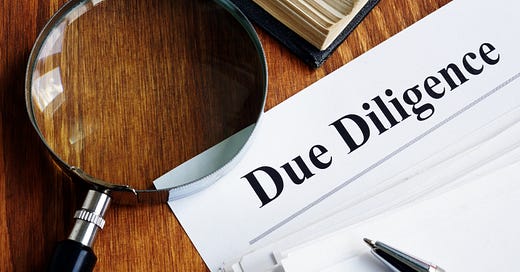Avoid Costly Mistakes: The Critical Role of Due Diligence
My husband and I’s ultimate goal is to own and operate a campground. We've already been under contract with two properties and have considered several others in our search for the perfect location. Deciding on the right business or property for our is challenging because it's difficult not to become emotionally invested. Our dream is to own a campground where we can raise our family, so every property we visit becomes we imagine our dreams taking shape. Each potential site we explore is more than just a piece of land; it's a vision of our future. We see the places where our children will play, the spots where we'll gather with friends and family, and the community we'll build.
Although we become emotionally invested in each property we view, we understand the importance of making practical decisions. We must go through the due diligence process to ensure the numbers make sense. If they don't, we have to move on, no matter how much we may envision our dreams taking shape there.
The Hard Lessons of Our First Property Contract
When we entered into the contract for the first property, we were making a major life change. We sold our house and our existing RV rental business to secure the down payment. The property was an existing campground in our area with wooded sites and a pond, perfectly matching the atmosphere we desired. We envisioned building a new playground for our kids, creating a walking trail behind the pond, and fostering a community within the campground that we would call home.
As things dreams were building out in our minds, we followed our due diligence checklist, a process we learned through the Buyers Workshop we attended through ARVC and advice from our lawyer. We invested thousands in inspections—checking electrical systems, water quality, and permits. However, a month before closing, the septic inspection revealed major issues. A new septic system was estimated to cost a quarter of the campground's purchase price.
Despite being deeply invested, we tried negotiating with the seller to lower the price or consider seller financing to bypass the bank's inspection requirements. Unfortunately, the seller was unwilling to make any concessions. We faced a tough decision: proceed and bear the $250,000+ cost of a new septic system along with potential downtime for the park, or walk away from the deal.
As emotionally invested as we were, we chose to walk away due to concerns about potential health department issues and legal repercussions from the current septic system's condition. We were devastated but we kept moving forward.
The Zoning Setback
About a year later, we found another property that seemed perfect for our needs. It had a gorgeous view, an old farmhouse, and barns that could be transformed into an RV repair shop or camp store. We knew it would be a significant undertaking since we would need to build the campground from scratch, including installing water, electricity, and sewer systems. Yet, we could clearly envision our dream coming together, so we decided to take the risk.
We applied for an SBA loan and began our due diligence process, and this time, everything checked out perfectly. However, we soon encountered a significant roadblock: zoning. The property was zoned for agricultural use, which conflicted with our plans to build a campground. To proceed with our project and secure the loan, the property needed to be rezoned as commercial, which we were unable to obtain.
Fortunately, our contract included a contingency clause, allowing us to back out without losing our deposit.
Life Happens For Us
Although these setbacks can feel like they are crushing our dreams, we like to believe that life happens for us, not to us. Where would we be if we hadn't done our due diligence? If we had purchased the first property, it could have been shut down due to the septic issues. With the second property, we would have never been able to build the campground we envisioned due to zoning restrictions.
It's essential to know when to take risks and when to hold back. Performing due diligence enables us to make informed decisions, ensuring that we move forward with clarity and confidence. Interested in what my due diligence checklist looks like? Let me know and I will send you a copy.
What I’m Reading
I read The Miracle Morning upon the recommendation of the women's mastermind group I'm part of, called The Society. The concept of The Miracle Morning is to wake up an hour earlier and spend 10 minutes on each of the "SAVERS": Silence, Affirmations, Visualization, Exercise, Reading, and Scribing. I've been incorporating this routine into my mornings instead of aimlessly scrolling through my phone, and I feel much more centered and prepared to take on the day. What does your morning routine look like?



